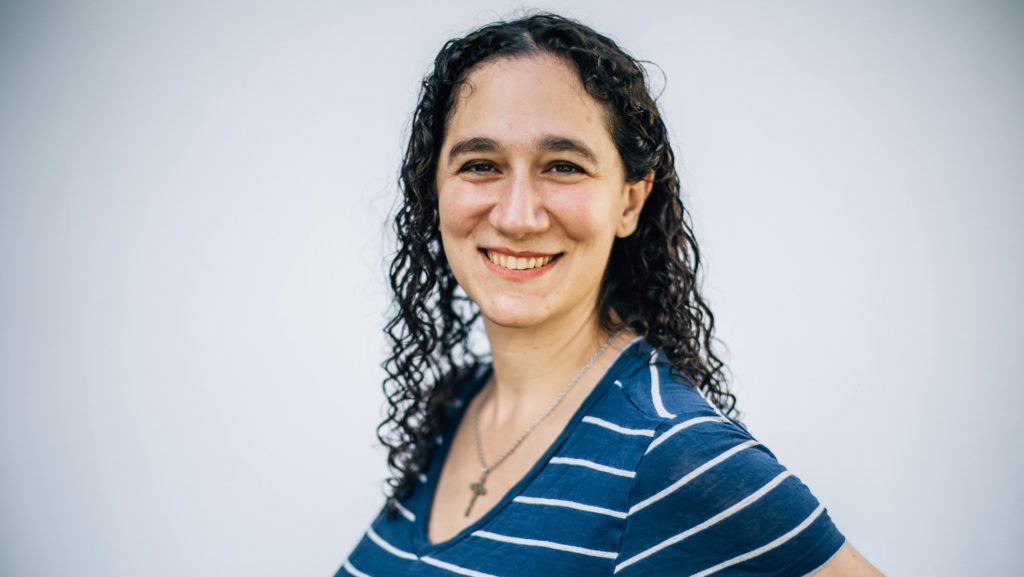Is the world "the wrong shape" for women? Leah Libresco Sargeant, author, family policy expert and mom of three, makes that case in her new book "The Dignity of Dependence: A Feminist Manifesto." She recently spoke with OSV News' Charles Camosy about society's treatment of women, the reality of women's needs and the importance of recognizing the ways in which we are dependent on each other.
Charles Camosy: Can you tell us a bit about the journey that led you to write a book like this? I'm thinking in particular of your journey toward Catholicism.
Leah Libresco Sargeant: I grew up as an atheist on Long Island. My mom says the first protest I ever went to was a pro-choice march … in utero. So, in some ways, it's pretty surprising for me to wind up as a pro-life Catholic. But, in the particular ways my parents raised me as a progressive feminist, they gave me a lot of the tools I needed to navigate here.
My parents are college professors, who raised me to follow the truth wherever it leads. When I went to college, I picked fights with the most interesting wrong people I could find, which were mostly the Catholics in my college debate group. It was only thanks to my parents' formation that I could love the truth more than my pride and change my mind about God.
Additionally, my mother raised me to be proud to be a woman, and to be very suspicious of any part of our culture that treated me like a defective man. At the heart of my book is the claim that women's equality to men is not premised on our interchangeability with men. We don't need to solve the problem of being a woman to be treated fairly.
Camosy: Why do you think the world is "the wrong shape" for women?
Sargeant: When we try to design for a sex-neutral person, we're designing for someone who has never existed and never will. We live in a world of men and women. When we don't take both sexes into account we often wind up with a "normal" that's strongly skewed to normal for men and which leaves women out.
This happens in a number of domains -- kitchen counters are high for the typical woman, medicines are dosed for men and women according to men's body weights -- but it's most pronounced in how we respond to the profound asymmetry of human fertility. Only women can bear a child. We treat pregnancy as peripheral, making it impossible to treat women or children justly.
Women are deeply, intimately exposed to the dependence of a child in the womb. Every one of us begins our life supported by our mother through that period of profound need. But we treat the mother-baby dyad as exceptional, not making space for the particular needs of pregnancy and not respecting the echoes of that relationship in our periods of dependence through aging, illness, disability, etc.
That leaves the child in the womb exposed to lethal danger, and, increasingly, the elderly, the disabled, the poor are targets for medical violence, too. There's no way to respect women as women without valuing relationships of need.
Camosy: How might reimagining what "burden" means help reshape the culture in a way that is better for the flourishing of women?
Sargeant: Fear of becoming a burden is one of the leading reasons people seek to end their lives through euthanasia. Fear of being limited by the burden of a child is a major driver of abortion. We don't get very far in denying that someone else's needs really can reshape our lives, and mingle griefs and joys.
When we do favors for each other, reassuring each other "It was nothing!" "Don't go out of your way!" and "Of course, you're not a burden" we're offering a dangerous catechesis. The intensity of the reassurance implies it would be a problem if the person you're helping were a burden, if they inconvenienced you, if they needed something they couldn't pay back.
I think it's good to be upfront that all of us burden others at certain points of our lives. We are lovable even when we can't pay back the love we receive. After all, our most profound relationship of dependence is our adoption as sons and daughters of God. We received the tremendous gift of the Crucifixion, with no ability to pay back what we receive. God carries us out of pure love -- we're allowed to offer and accept love from each other on those terms, too.
Camosy: What are some ways in which men, in particular, can contribute to your proposed project here?
Sargeant: Women are more often exposed to others' need without making an active choice. Once I'm pregnant, I don't actively divert calcium from my bones to my baby -- it happens without my will. I navigate how to respond emotionally and practically to the gift my body is making of itself.
For men, participating in relationships of dependence more often relies on an active choice to run toward need. I think it's worth thinking about where need is visible to the men in our lives, especially the single men. Where do each of us need more strength than we ourselves possess, and can we more often ask for help from male friends, rather than purchase help through gig workers, etc.
Men are much less needed for their wages (and that's OK) but it's important to recognize that men possess more strength than they need only for themselves. It's ready to be offered to others -- we have to open the channels. I think one of the smallest, practical ways to respond is for churches to have young men sign up as snow shovellers and to assign them to members of the parish who struggle to shovel themselves out. The gift of strength is meant to be called upon and offered in love.

